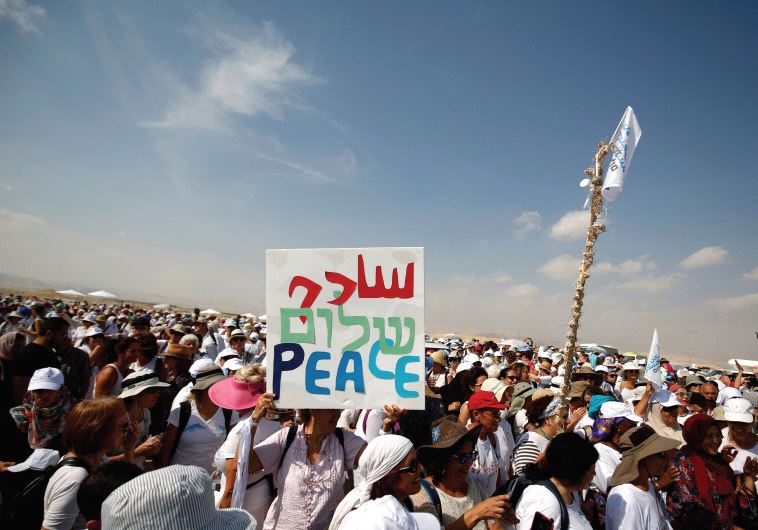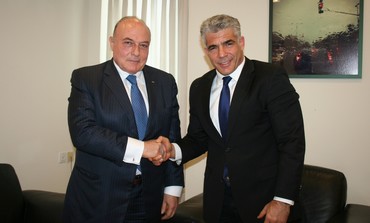I listened very carefully to the UN speeches of both Prime Minister Naftali Bennett and President Mahmoud Abbas. I can’t say that I was surprised by either speech. I can say, as I have said for many of the past years, that I was once again disappointed. It is not that the UN speeches of these leaders are so important, they are not. The UN General Assembly meeting of every year where leaders from all around the world gather to make their speeches is an occasion for most of them to exhibit their own self-importance to their own audience back at home. Rarely is a speech made in this forum earth-shattering or even particularly noteworthy.
Sometimes the speeches are entertaining and are echoed around the world in political cartoons, or memes, or some form of copy-paste on social media. Many remember the speeches of Muammar Gaddafi, which although seemed to be unending, were nevertheless amusing. And of course, many remember the speeches of Benjamin Netanyahu with his props and accessories, which always brought about waves of entertaining responses all around the world on social media. I did not expect Bennett nor Abbas to be entertaining this year. They did not disappoint in that regard.
But I always hope that they might say something that will pierce through the closed minds of the people back at home, and here I would emphasize that the potential power of change through words needs to be leveraged toward the people on the other side of the conflict and not their own audience back home.
Rarely do leaders in a conflict zone take the opportunity to try to speak to the people with whom they are in a conflict. That is a great pity. I recall vividly when on November 9, 1977, Egyptian president Anwar Sadat, speaking to the Egyptian Parliament, said he was willing to go to Israel, to Jerusalem, even to the Knesset to speak about peace.
He was speaking in his own parliament to the people of Israel and to the Israeli leaders, not to his own people at home. On November 15, 1977, in a letter to Sadat, prime minister Menachem Begin seized the moment and extended an invitation to Sadat to come to Israel. Begin wrote: “Your Excellency’s readiness to undertake such a visit, as expressed to the People’s Council of Egypt, has been noted here with deep and positive interest, as has your statement that you wish to address the members of our parliament, the Knesset, and to meet with me.”
Sadat quickly accepted the invitation, and the rest is history.
Couldn’t history be made if Bennett, or any Israeli leader, speaking in the UN would reach out to the Palestinian people and their leaders and say I am ready to come to Ramallah to meet with your leaders and your people and speak about peace? Wouldn’t it make some dent in people’s minds if Abbas had said in the UN that he was ready to come to Jerusalem, to the Knesset, to speak to Israel’s leaders and to the people of Israel about peace?
Maybe it is too late for Abbas to have an impact on the Israeli public. Maybe too many bad Abbas speeches have been heard by the Israeli people to change anyone’s mind. Maybe it is ridiculous to expect that the person who headed the Council of Israeli Settlers say that he is willing to recognize the political rights of the Palestinian people. Maybe the head of an Israeli political party who has said hundreds of times that he is opposed to the idea of a Palestinian state cannot be expected to suddenly speak about the chances of peace between Israel and Palestine.
PERSONALLY, I have expectations of people who call themselves leaders. I expect from them more than good governance, honesty, integrity and working for the people and not for themselves. Those qualities should be taken for granted, although we (in Israel and in Palestine) have learned from experience that they often don’t even exist among our leaders. But I expect more than that. I expect them to have a vision for our future that includes a reality that is better than the present. I expect that vision to have a plan and a strategy behind it. I expect them to at least try to address and work on resolving the most cardinal problems that we face. There is no more cardinal a problem facing Israel and Palestine than the Israeli-Palestinian conflict. Many Israelis may think that the problem was swept under the carpet by unilateral recognition of Jerusalem as the capital of Israel, or by peace and normalization agreements with some Arab countries. Israel’s most existential problem was never in Dubai, nor in Khartoum, nor in Rabat. Israel’s most existential problem is in Jerusalem, in the West Bank and in Gaza.
As much as some Israeli leaders may wish, we cannot and will never be able to run away from the Israeli-Palestinian conflict. Maybe most Palestinians think that the Israeli occupation will never end – maybe many Israelis think that their control over the West Bank will never end, but it will. It has to. The continuation of the occupation, the continuation of this conflict will not last forever.
The situation will change and that change will be brought about by leaders. And if not now, then sometime in the future.


